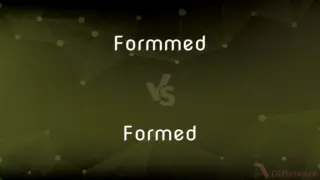Impune vs. Impugn — Which is Correct Spelling?
Edited by Tayyaba Rehman — By Maham Liaqat — Updated on July 24, 2024
Impune is the incorrect spelling of impugn, which means to challenge as false or cast doubt upon.

Table of Contents
Which is correct: Impune or Impugn
How to spell Impugn?

Impune
Incorrect Spelling

Impugn
Correct Spelling
ADVERTISEMENT
Key Differences
Visualize "impugn" as “I'm pugnacious,” reflecting its meaning of attacking or questioning.
The word "impugn" relates to the Latin "pugnare," meaning to fight; keeping this root in mind can help retain the correct spelling.
The word "impugn" has six letters, ending with "gn."
Remember that impugn contains "pugn" which is similar to "pugnacious," both suggesting a fight or challenge.
Avoid spelling it as "impune"; it’s "impugn" with "gn" at the end.
ADVERTISEMENT
How Do You Spell Impugn Correctly?
Incorrect: They were quick to impune the new policy as ineffective.
Correct: They were quick to impugn the new policy as ineffective.
Incorrect: He tried to impune her integrity in the meeting.
Correct: He tried to impugn her integrity in the meeting.
Incorrect: Can we really impune his decision without more evidence?
Correct: Can we really impugn his decision without more evidence?
Incorrect: It’s unfair to impune his reputation based merely on assumptions.
Correct: It’s unfair to impugn his reputation based merely on assumptions.
Impugn Definitions
To cast doubt on; assail by words or arguments.
His work ethics were impugned unfairly by his colleagues.
To oppose or attack someone or something as false or refutable.
Critics impugned the author's claims in her latest book.
To dispute the truth or honesty of something or someone.
He impugned their motives after learning about the secret meeting.
To attack as false or questionable; challenge in argument.
The lawyer decided to impugn the witness's credibility.
To criticize or refute strongly.
The scientist impugned the established theory with new evidence.
Dispute the truth, validity, or honesty of (a statement or motive); call into question
The father does not impugn her capacity as a good mother
To attack as false or questionable; challenge in argument
Impugn a political opponent's record.
To assault, attack.
(transitive) To verbally assault, especially to argue against an opinion, motive, or action; to question the truth or validity of.
To attack by words or arguments; to contradict; to assail; to call in question; to make insinuations against; to gainsay; to oppose; as, to impugn a person's integrity.
The truth hereof I will not rashly impugn, or overboldly affirm.
Attack as false or wrong
Impugn Meaning in a Sentence
How can you impugn my honesty without any substantial proof?
To impugn someone’s character over minor mistakes is quite unfair.
Many people impugn the effectiveness of the new regulations.
He did not hesitate to impugn the outdated beliefs that were still prevalent in society.
It's common for politicians to impugn their rivals' proposals.
It is not right to impugn her motives without understanding the situation.
It's unwise to impugn the value of traditional practices without careful consideration.
During the trial, the defense lawyer tried to impugn the prosecution's evidence.
Critics should not impugn young artists' efforts so harshly.
Journalists often impugn the integrity of public figures.
His attempt to impugn my professionalism backfired when my results spoke for themselves.
She stood up to impugn the false rumors being spread about her.
The new theory was designed to impugn the conventional approach.
Historians often impugn the accuracy of popular myths.
To impugn the jury's decision is to question the entire judicial system.
Before you impugn his choices, make sure you understand his reasons.
They were quick to impugn the study's methodology.
The editor wrote a scathing article to impugn the film's historical inaccuracies.
The scientist was ready to impugn any theory that contradicted his findings.
Some critics are too eager to impugn new technologies.
It's not uncommon for one scientist to impugn another's research.
They did not hesitate to impugn the old policies that caused more harm than good.
Students should learn how to impugn arguments critically and constructively.
The lawyer's strategy was to impugn every piece of evidence presented by the other side.
Impugn Idioms & Phrases
Impugn someone's honor
To attack someone's reputation or dignity.
The accusations made in the book impugn the president's honor.
Impugn the credibility of
To suggest that someone or something is not believable.
The defense attorney sought to impugn the credibility of the witness.
Impugn someone's motives
To suggest that someone's intentions are not honest.
The opposition was quick to impugn the senator's motives.
Impugn someone's professionalism
To question the professional conduct or ability of someone.
The review seemed to impugn his professionalism unfairly.
Impugn a decision
To express doubt about the correctness of a decision.
Many impugned the committee's decision as biased.
Impugn the findings
To challenge the results or conclusions of research or investigation.
The company impugned the findings of the environmental report.
Impugn someone's character
To attack or criticize someone's character.
It's quite harsh to impugn someone's character based on hearsay.
Impugn someone's integrity
To question someone's honesty or morals.
It's a serious matter to impugn someone's integrity without any evidence.
Impugn someone's testimony
To cast doubt on the truthfulness or reliability of someone's testimony.
The lawyer tried to impugn the key witness's testimony.
Impugn the truth
To challenge the accuracy or honesty of a statement.
He stood up in the meeting to impugn the truth of the financial reports.
Impugn someone's ability
To express doubt about someone's capability to perform tasks.
It's unfair to impugn his ability just because he made one mistake.
Impugn the proposal
To express criticism or disapproval of a proposal.
The board member impugned the new strategy proposal as risky.
Impugn the study
To criticize or question the validity of a study.
They were quick to impugn the study for its lack of a control group.
Impugn the theory
To argue against a particular theory or idea.
He wrote several articles to impugn the prevailing economic theory.
Impugn the process
To criticize the manner in which something is done.
The activist impugned the process used to approve the new development.
Impugn the law
To criticize or challenge the fairness or validity of a law.
Many activists impugn the law as outdated and unjust.
Impugn the outcome
To challenge or question the result of an event or action.
He impugned the outcome of the election, claiming it was rigged.
Impugn someone's leadership
To question the effectiveness or appropriateness of someone's leadership.
The article impugned her leadership during the crisis.
Impugn the verdict
To express disagreement with or disbelief in a legal verdict.
The family impugned the verdict, calling for a new trial.
Impugn the system
To express distrust or criticism of an established system or institution.
His speech impugned the system as corrupt and ineffective.
Common Curiosities
Why is it called impugn?
Impugn comes from the Latin "impugnare," meaning to attack or to fight against, reflecting its meaning of challenging or disputing something.
How is impugn used in a sentence?
Impugn is used as a verb to express doubt or criticism about the truthfulness or validity of something.
What is the pronunciation of impugn?
Impugn is pronounced as /imˈpjuːn/.
What is the first form of impugn?
The first form of impugn is "impugn."
How do we divide impugn into syllables?
Impugn is divided into syllables as im-pugn.
What is the verb form of impugn?
Impugn itself is a verb.
What is the second form of impugn?
The second form of impugn is "impugned."
What is another term for impugn?
Another term for impugn could be "challenge" or "dispute."
How many syllables are in impugn?
Impugn has two syllables.
What is the singular form of impugn?
Impugn does not have a singular form as it is a verb.
What is a stressed syllable in impugn?
The stressed syllable in impugn is pugn.
Is impugn a noun or adjective?
Impugn is a verb.
What is the third form of impugn?
The third form of impugn is "impugned."
What part of speech is impugn?
Impugn is a verb.
Is impugn a vowel or consonant?
Impugn starts with a vowel sound.
Is impugn a countable noun?
Impugn is not a noun; it is a verb.
Is impugn a collective noun?
No, impugn is not a noun.
What is the root word of impugn?
The root word of impugn is the Latin "pugnare," which means to fight.
What is the plural form of impugn?
Impugn does not have a plural form as it is a verb.
Is the impugn term a metaphor?
No, impugn is not typically used as a metaphor.
Is the word “impugn” a Direct object or an Indirect object?
Impugn does not serve as an object; it is a verb.
Is impugn an abstract noun?
No, impugn is a verb.
Which preposition is used with impugn?
Common prepositions used with impugn include "for" and "as."
What is the opposite of impugn?
The opposite of impugn could be "confirm" or "support."
Which vowel is used before impugn?
Typically, no vowel is specifically required before the verb impugn.
Is impugn an adverb?
No, impugn is not an adverb.
Is impugn a negative or positive word?
Impugn is generally considered a negative word as it implies criticism or doubt.
Is the word impugn imperative?
Impugn can be used in imperative forms, such as in commands or requests.
Is the word impugn Gerund?
No, but impugning (the -ing form) is a gerund.
Which determiner is used with impugn?
Determiners are not typically used with verbs like impugn.
Which conjunction is used with impugn?
Conjunctions are not specifically linked to the use of impugn.
Which article is used with impugn?
Articles are not used with verbs like impugn.
Share Your Discovery

Previous Comparison
Farce vs. Farse
Next Comparison
Thowt vs. ThoughtAuthor Spotlight
Written by
Maham LiaqatEdited by
Tayyaba RehmanTayyaba Rehman is a distinguished writer, currently serving as a primary contributor to askdifference.com. As a researcher in semantics and etymology, Tayyaba's passion for the complexity of languages and their distinctions has found a perfect home on the platform. Tayyaba delves into the intricacies of language, distinguishing between commonly confused words and phrases, thereby providing clarity for readers worldwide.








































